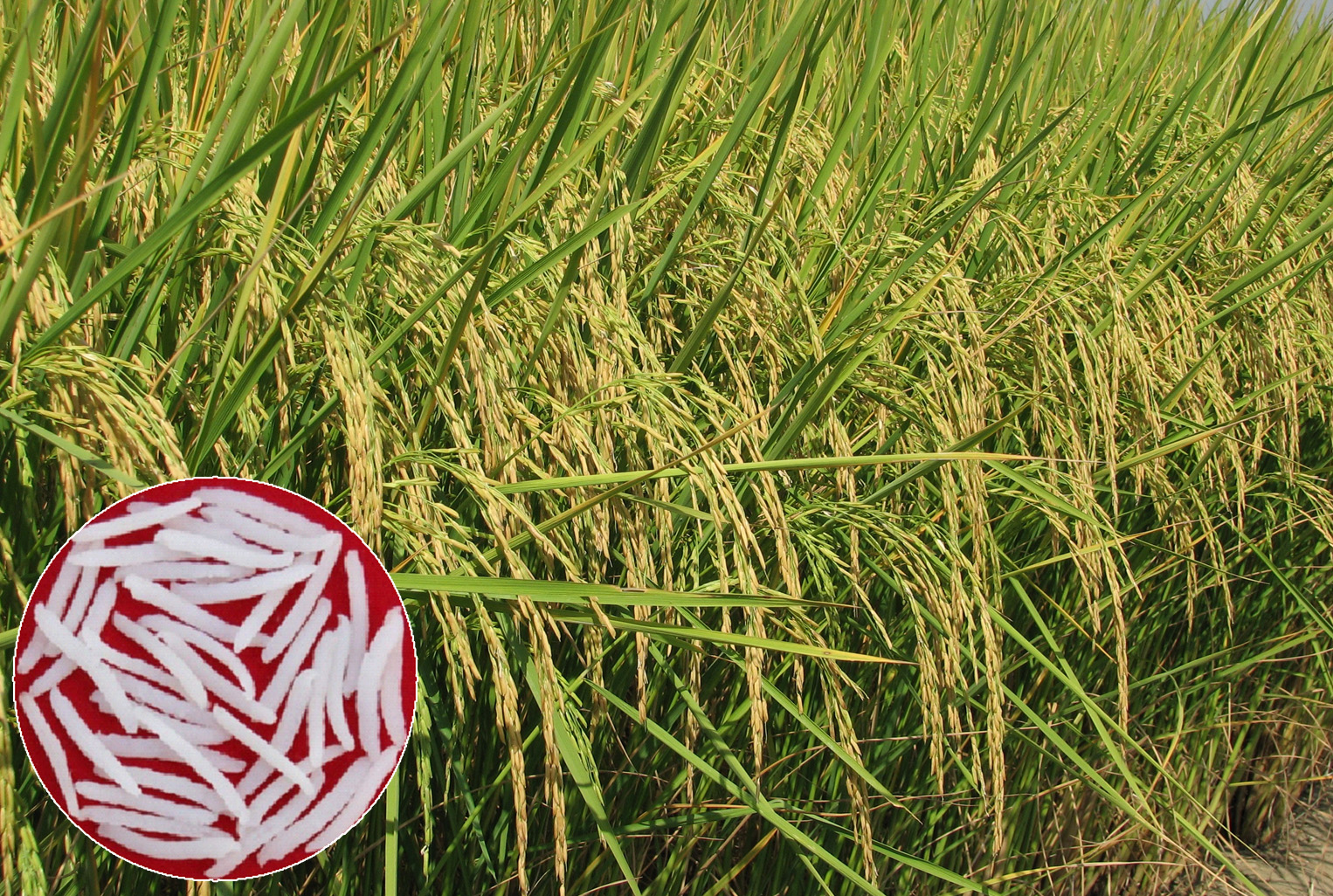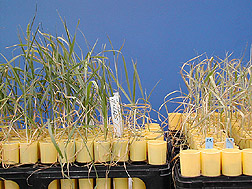|
Dr Vijaipal Singh
Vijaipal Singh (born 17 January 1945) in Narsan Kalan, Haridwar District of Uttarakhand State, India is an Agricultural scientist associated with the Indian Council of Agricultural Research (ICAR) and is known for his contributions to the science of rice genetics and breeding. He is well known for his contributions in developing the most popular Basamti rice variety, Pusa Basmati 1121. A post graduate and a doctoral degree (PhD) holder in Agriculture Botany from Agra University, he started his career as a research assistant at the Indian Agricultural Research Institute (IARI), New Delhi in 1968 and retired as a professor at the Division of Genetics, IARI. Singh is credited with several articles published in peer reviewed journals. In recognition of his services to the nation, he was honored by the Government of India, in 2012, with the fourth highest Indian civilian award of Padma Shri. Awards and honors V. P. Singh was honoured with Hari Om Ashram Trust Award by the Indian Cou ... [...More Info...] [...Related Items...] OR: [Wikipedia] [Google] [Baidu] |
Agra University
Dr. Bhimrao Ambedkar University, formerly Agra University, is an Autonomous University located in Agra, Uttar Pradesh, India. The university is named after B. R. Ambedkar, Bhimrao Ambedkar, Indian scholar, social reformer, and the architect of the Indian Constitution. Institute of Engineering and Technology The Institute of Engineering and Technology Khandari, Agra (I.E.T. Khandari, Agra), situated at the Khandari campus in the city of Agra, was established in 1998 and is the engineering institute of the university. Institute of Social Sciences The Institute of Social Sciences, Agra, Institute of Social Sciences (ISS), Agra is situated at Paliwal campus in university premises. Notable alumni *Charan Singh, former Prime Minister of India *Atal Bihari Vajpayee, former Prime Minister of India *Mulayam Singh Yadav, former CM * Santosh Gangwar, Committee on Public Undertakings, Chairperson, Committee on public undertakings *Dronamraju Krishna Rao, geneticist *Ganesh Prasad Pandey, ... [...More Info...] [...Related Items...] OR: [Wikipedia] [Google] [Baidu] |
Pusa Basmati 1121
Pusa Basmati 1121 is an independently derived Basmati rice variety, evolved through the process of hybridization over a long breeding process. This variety of basmati rice was developed by Padma Shri awardee Dr Vijaipal Singh at Indian Agricultural Research Institute (IARI), New Delhi. It was released for commercial cultivation in ''Kharif'' season of 2003 as Pusa 1121 (Pusa Sugandh 4). By 2007, the variety has become widely popular with farmers, and was renamed as Pusa Basmati 1121 in 2008. It holds the world record for highest kernel elongation on cooking. Breeding history During the 1990s Indian Agricultural Research Institute was actively pursuing the Basmati varietal development programme with several hybridisations under evaluation. One among these was a cross, Pusa 614 derived from several intermediate crosses made between Basmati 370 and Type 3, two traditional cultivars. With the objective of improving grain length and linear cooked kernel elongation among the progenies ... [...More Info...] [...Related Items...] OR: [Wikipedia] [Google] [Baidu] |
Genetics
Genetics is the study of genes, genetic variation, and heredity in organisms.Hartl D, Jones E (2005) It is an important branch in biology because heredity is vital to organisms' evolution. Gregor Mendel, a Moravian Augustinian friar working in the 19th century in Brno, was the first to study genetics scientifically. Mendel studied "trait inheritance", patterns in the way traits are handed down from parents to offspring over time. He observed that organisms (pea plants) inherit traits by way of discrete "units of inheritance". This term, still used today, is a somewhat ambiguous definition of what is referred to as a gene. Trait inheritance and molecular inheritance mechanisms of genes are still primary principles of genetics in the 21st century, but modern genetics has expanded to study the function and behavior of genes. Gene structure and function, variation, and distribution are studied within the context of the cell, the organism (e.g. dominance), and within the ... [...More Info...] [...Related Items...] OR: [Wikipedia] [Google] [Baidu] |
Plant Breeding
Plant breeding is the science of changing the traits of plants in order to produce desired characteristics. It has been used to improve the quality of nutrition in products for humans and animals. The goals of plant breeding are to produce crop varieties that boast unique and superior traits for a variety of applications. The most frequently addressed agricultural traits are those related to biotic and abiotic stress tolerance, grain or biomass yield, end-use quality characteristics such as taste or the concentrations of specific biological molecules (proteins, sugars, lipids, vitamins, fibers) and ease of processing (harvesting, milling, baking, malting, blending, etc.). Plant breeding can be performed through many different techniques ranging from simply selecting plants with desirable characteristics for propagation, to methods that make use of knowledge of genetics and chromosomes, to more complex molecular techniques. Genes in a plant are what determine what type of qualit ... [...More Info...] [...Related Items...] OR: [Wikipedia] [Google] [Baidu] |
Indian Agricultural Research Institute
The Indian Agricultural Research Institute (IARI), commonly known as the Pusa Institute, is India's national institute for agricultural research, education and extension. The name Pusa Institute is derived from the fact that the institute was originally located in Pusa, Bihar as the Imperial Institute of Agricultural Research in 1911. It was then renamed as the Imperial Agricultural Research Institute in 1919 and following a major earthquake in Pusa, it was relocated to Delhi in 1936. The current institute in Delhi is financed and administered by the Indian Council of Agricultural Research (ICAR). The IARI was responsible for the research leading to the " Green Revolution in India" of the 1970s. History The institute was established in 1905 at Pusa, Bihar, with the financial assistance of Henry Phipps, Jr., an American philanthropist. Phipps was a family friend of Lady Curzon, the daughter of an American millionaire, and the wife of Lord Curzon, the Viceroy of India. Phipps ... [...More Info...] [...Related Items...] OR: [Wikipedia] [Google] [Baidu] |
Padma Shri
Padma Shri (IAST: ''padma śrī''), also spelled Padma Shree, is the fourth-highest Indian honours system, civilian award of the Republic of India, after the Bharat Ratna, the Padma Vibhushan and the Padma Bhushan. Instituted on 2 January 1954, the award is conferred in recognition of "distinguished contribution in various spheres of activity including the arts, education, industry, literature, science, acting, medicine, social service and public affairs". It is awarded by the Government of India every year on Republic Day (India), India's Republic Day. History Padma Awards were instituted in 1954 to be awarded to citizens of India in recognition of their distinguished contribution in various spheres of activity including the arts, education, Private industry, industry, literature, science, acting, medicine, social service and Public affairs (broadcasting), public affairs. It has also been awarded to some distinguished individuals who were not citizens of India but did contri ... [...More Info...] [...Related Items...] OR: [Wikipedia] [Google] [Baidu] |
Indian Council Of Agricultural Research
The Indian Council of Agricultural Research (ICAR) is an autonomous body responsible for co-ordinating agricultural education and research in India. It reports to the Department of Agricultural Research and Education, Ministry of Agriculture. The Union Minister of Agriculture serves as its president. It is the largest network of agricultural research and education institutes in the world.''India 2016'', "Agriculture" p.93, Ministry of Information and Broadcasting, (New Delhi). The committee to Advise on Renovation and Rejuvenation of Higher Education (Yashpal Committee, 2009) has recommended setting up of a constitutional body – the National Commission for Higher Education and Research – which would be a unified supreme body to regulate all branches of higher education including agricultural education. Presently, regulation of agricultural education is the mandate of ICAR, Veterinary Council of India (Veterinary sub-discipline) and Indian Council of Forestry Research and Educ ... [...More Info...] [...Related Items...] OR: [Wikipedia] [Google] [Baidu] |
Government Of India
The Government of India (ISO: ; often abbreviated as GoI), known as the Union Government or Central Government but often simply as the Centre, is the national government of the Republic of India, a federal democracy located in South Asia, consisting of 28 union states and eight union territories. Under the Constitution, there are three primary branches of government: the legislative, the executive and the judiciary, whose powers are vested in a bicameral Parliament, President, aided by the Council of Ministers, and the Supreme Court respectively. Through judicial evolution, the Parliament has lost its sovereignty as its amendments to the Constitution are subject to judicial intervention. Judicial appointments in India are unique in that the executive or legislature have negligible say. Etymology and history The Government of India Act 1833, passed by the British parliament, is the first such act of law with the epithet "Government of India". Basic structure The gover ... [...More Info...] [...Related Items...] OR: [Wikipedia] [Google] [Baidu] |
Central Rice Research Institute
The National Rice Research Institute has been established since 1966 under Indian Council of Agricultural Research (ICAR) but it was setup on April 23, 1946 at Bidhyadharpur, Cuttack, Odisha with an experimental farm land of 60 hectares. Research The institute's scientists have many research results to their credit in various disciplines of rice research, including: * Biochemistry * Blue green algae * Entomology * Food technology * Nematology * Physiology * Plant breeding and genetics * Plant pathology Plant pathology (also phytopathology) is the scientific study of diseases in plants caused by pathogens (infectious organisms) and environmental conditions (physiological factors). Organisms that cause infectious disease include fungi, oomy ... and mycology Site The site occupies approximately . Many of the scientists are housed on the campus, which includes a co-operative store, co-operative dairy, and a CGHS dispensary. There is also a hostel and in-transit accommodat ... [...More Info...] [...Related Items...] OR: [Wikipedia] [Google] [Baidu] |
Ashok K Singh
Dr. Ashok Kumar Singh (born 1 July 1962) is an Indian scientist specializing in the field of Plant Genetics and Breeding. He is known for his contribution to Basmati rice breeding. He is former director and Vice-Chancellor of the Indian Agricultural Research Institute, New Delhi, a deemed to be university. Dr Singh is an alumnus of Banaras Hindu University, Varanasi where he did his bachelor's degree and Masters Program in agriculture with specialisation in plant genetics and breeding. He received doctorate degree from the Indian Agricultural Research Institute, New Delhi for his research on rice breeding. Awards and honors Dr Ashok Kumar Singh has received several awards and recognitions for his services to the society. He is fellow of Indian National Science Academy, New Delhi; National Academy of Agricultural Sciences The National Academy of Agricultural Sciences (NAAS) is a Government of India funded agency, established in 1990, is a research platform in the fields of ... [...More Info...] [...Related Items...] OR: [Wikipedia] [Google] [Baidu] |
Trilochan Mohapatra
Trilochan Mohapatra (born 20 April 1962) is an Indian biotechnologist, geneticist, a government secretary of the Department of Agricultural Research and Education (DARE) and the director general of the Indian Council of Agricultural Research. Known for his studies in the fields of molecular genetics and genomics, Mohapatra is an elected fellow of the National Academy of Sciences, India, the National Academy of Agricultural Sciences, the Indian National Science Academy and the Indian Society of Genetics and Plant Breeding. The Department of Biotechnology of the Government of India awarded him the National Bioscience Award for Career Development, one of the highest Indian science awards, for his contributions to biosciences in 2003. Biography Trilochan Mohapatra was born on 20 April 1962 at Kharibil village in Cuttack in the Indian state of Odisha. After completing early schooling at Laxmi Narayan High School at Eranch near his home village in 1978, he did his pre-university st ... [...More Info...] [...Related Items...] OR: [Wikipedia] [Google] [Baidu] |





